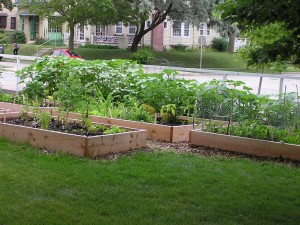
Campus garden operations at UW-Milwaukee include the Physics Gardens with plots available for rent each year, campus food gardens at Sandburg, a fruit orchard at Sandburg, indoor hydroponics systems operating year-round, and research gardens managed by Honors College.
Sign up for the Community Supporting Agriculture Program today!
The Community Supporting Agriculture Program provides students, faculty, staff, and the community the opportunity to volunteer in the UWM gardens, grow food, support other students, and learn all year round. If you are interest ingetting involved, sign-up today!
This summer, the CSAP program will offer drop-in volunteer hours on Mondays and Thursdays from 3pm-5pm. Register at the link above to receive more details.
Physics Gardens
The raised beds along Kenwood Boulevard were designed for students, faculty, and staff to grow their own produce and convene in a communal gardening space. Volunteers originally built the raised beds in 2011 and continue to fill them with compost each year. In 2024, the garden beds were rebuilt with the support of donations and volunteer, to allow for better access and sunlight.
Gardeners may renew their plots from year to year, and new gardeners come on board around April 1st. If you are a new gardener interested in plot, please complete our interest form. There is currently a waitlist, and we cannot guarantee garden plot availability.
The Physics Gardens also features a rain water cistern which collects water from a portion of the roof. Gardeners have access to this cistern for water crops.
Sandburg Gardens
From a collaborative student design perspective, the second campus garden was built in the spring of 2012. These gardens, located near East Tower, have served several functions over the past decade. Currently, the gardens feature perennial herbs and fruits along with annual garden spaces dedicated to growing food for the UWM Food Center and Pantry. The Sandburg Gardens – as are many gardens! – are in a state of transition with the goal of creating a natural garden space with a focus on native plants and perennials which support the campus ecosystem while also providing food for students.
This site also features campus hoop house where UWM’s on-site composting takes place. UWM students raised funds and built the Hoop House and have since contributed additions such as the experiment Earth Cube. Further, extensive stormwater green infrastructure was also developed at the gardens.
Sandburg Fruit Orchard
In 2017, UWM and community volunteers established a fruit orchard north of Sandburg Residence Halls. The orchard features apples, peaches, pears, and even a Medlar tree – used by the Anthropolgy department to support research efforts. Fruit grown in the orchard is harvested by the Office of Sustainability and CSAP volunteers and delivered to the UWM Food Center and Pantry, providing free access to fresh produce for students.
Hydroponics Systems
Through a 2023 Green Fund project, students collaborating with the Office of Sustainability brought two hydroponics units to campus to grow fresh greens, herbs, and produce year-round. One of the units is managed by the Office of Sustainability and the other unit is managed the Nutritional Sciences Club.
Research Gardens
The UWM Honors College manages a research garden to support ongoing studies of historic & prehistoric plant dyes and textile craft traditions.
UWM Food and Garden Club
The UW-Milwaukee Food & Garden Club began during the fall semester of 2010, in conjunction with the Food for Thought program. Spearheaded by the Office of Sustainability at UWM, the Food & Garden Club is comprised of students, faculty, and staff. The group hosts informal workshops, volunteering opportunites, and small events for those on campus interested in learning more about gardening.
The mission of the Food and Garden Club is to develop & maintain campus gardens that provide access for UWM students, staff, and faculty:
- to grow healthy, affordable, local produce
- to teach the skills and share the joys of food gardening and healthy eating
- to cultivate sustainability in lifestyles and the campus environment.
To be added to the UWM Food and Garden Club email list, please send your request to Lindsay Frost, lgfrost@uwm.edu.

To be added to the UWM Food and Garden Club email list, please send your request to Lindsay Frost at lgfrost@uwm.edu.